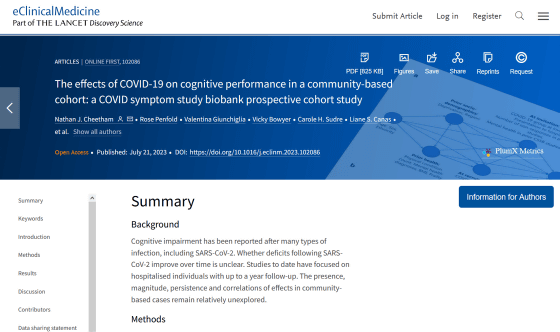It turns out that the decline in cognitive function due to ``long COVID'' may persist for more than two years from the new corona infection

It is known that the new coronavirus infection (COVID-19) causes sequelae called ``
The effects of COVID-19 on cognitive performance in a community-based cohort: a COVID symptom study biobank prospective cohort study - eClinicalMedicine
https://doi.org/10.1016/j.eclinm.2023.102086

Some people's brain function still affected by Long COVID years after infection - King's College London
https://www.kcl.ac.uk/news/some-peoples-brain-function-still-affected-by-long-covid-years-after-infection
Brain Function Can Still Be Affected by COVID Years After Infection, Study Finds : ScienceAlert
https://www.sciencealert.com/brain-function-can-still-be-affected-by-covid-years-after-infection-study-finds
In Japan, from May 8, 2023, the classification of the new coronavirus infectious disease (COVID-19) under the infection law will shift from the conventional 'type 2' to 'type 5 infectious disease' , and according to the infection law, it will be a seasonal It has been treated in the same way as sexually transmitted influenza, chickenpox, and acquired immunodeficiency syndrome (AIDS) . However, the change in the legal framework does not change the symptoms of COVID-19, and if it develops, various symptoms such as high fever and general muscle pain will appear.
In addition, long COVID, which is known as a sequela of COVID-19, is known to cause symptoms such as deterioration of concentration, memory, and cognitive function. Its societal impact is feared to be severe , with some estimates that tens of millions of people worldwide suffer from Long COVID.
Pointed out that ``long COVID'', in which the symptoms of the new coronavirus last for a long time, is more dangerous than is known-GIGAZINE

Therefore, a research team at King's College London analyzed the results of cognitive task performance conducted in 2021 and 2022 for patients who developed COVID-19 in 2020. In the test, the subject's ability was evaluated for 12 items such as memory, attention, reasoning ability, information processing speed, and body control. Of the subjects invited to participate in the experiment, 3335 completed the 2021 test, and 1768 completed both the 2021 and 2022 tests.
The analysis showed that subjects with long COVID-19 symptoms lasting more than 12 weeks had the most severe cognitive decline, with adverse effects comparable to 10 years of aging. Also, the second test was conducted about two years after the subjects developed COVID-19, but the research team reported that those who experienced long-term COVID-19 did not show improvement in cognitive function. I'm here.
Lead author of the paper, Dr Nathan Cheetham of King's College London, said: 'Our findings suggest that people who have lived with symptoms for a long time after developing COVID-19 may have improved their ability to recall words and shapes. Our findings suggest that the effects of COVID-19 on the mental processes of people are still detectable an average of nearly two years after initial infection.'

On the other hand, even subjects who had long-term COVID-19, if they felt themselves ``completely recovered from the novel coronavirus,'' had cognitive function similar to that of those who had never had COVID-19. I also found out that I had a This indicates that cognitive function may recover over time, even if it has become a long COVID.
Ceetham said that tests of people who felt they had fully recovered from COVID-19 had no effect on their performance, even if they had symptoms that lasted for months and were believed to be experiencing long COVID-19. The results are good news, highlighting the need to monitor those whose brain function has been most impacted by COVID, to see how cognitive symptoms persist, and to provide support for recovery. I am,” he claims.
Claire Steves, a clinical aging researcher at King's College London, said: 'Two years after the initial infection, we still do not feel fully recovered, and the long-term effects of the coronavirus have made life difficult. There is the fact that some people continue to be affected, and more research is needed to understand why this happens and what can be done to help patients.' .

Related Posts:
in Science, Posted by log1h_ik






